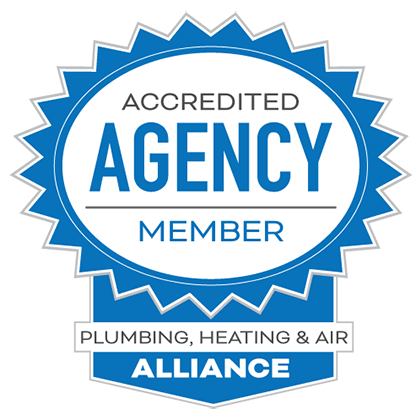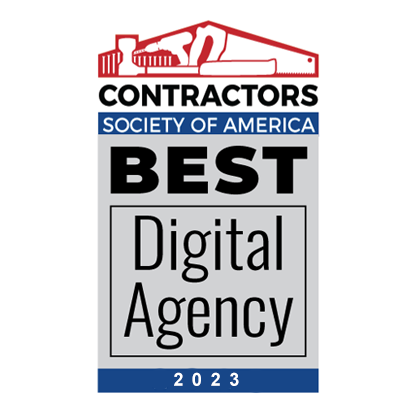Plumbing PPC is a marketing strategy that uses paid advertising to generate plumbing leads.
You are charged a fee each time a user clicks on your PPC ad, regardless of whether the user converts into a customer.
I’m Nolen Walker – the founder and CEO of Plumbing Webmasters – a digital marketing agency for plumbers.
Over the past 14+ years, I’ve helped local plumbing contractors optimize their pay-per-click campaigns to maximize conversions and minimize ad spend.
PPC advertising is an effective method to reach nearby prospects while showcasing your brand to online users.
Below, I’ll outline plumbing PPC best practices and how you can leverage paid advertising platforms to drive consistent plumbing leads in 2025.
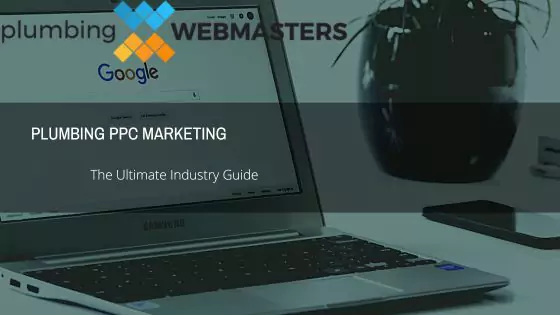
What is Plumbing PPC Marketing?
Plumbing PPC marketing (pay-per-click advertising) involves displaying ads to local consumers on various platforms and paying a fee each time the ad is clicked.
The cost per click (CPC) varies by the advertising platform, location, and search query (e.g., “plumber near me”).
Google Ads is the platform most commonly associated with PPC for plumbers.
Understanding Plumbing PPC
PPC ads use an auction system that determines the cost per click, which ads are shown, and in what order.
For example, Google Ads allows plumbers to bid on keywords and set a maximum daily budget.
When consumers search for a plumbing-related query, Google Ads activates its auction system to select which ads display to that user and in what order.
Your max (maximum) bid is the most you will pay for a click.
Another factor Google Ads considers is Quality Score, which is based on the following criteria:
- Expected CTR: Google’s estimate for the % of users who will click through your ad.
- Ad Relevance: How closely your ad matches the user’s search query, including its intent.
- Landing Page Experience: How useful and easy-to-use your landing page is for users who click through your ad, including its relevance to the ad it connects to.
These factors combine to form a quality score, which makes it easier for Google to rank the best ad in the top spot.
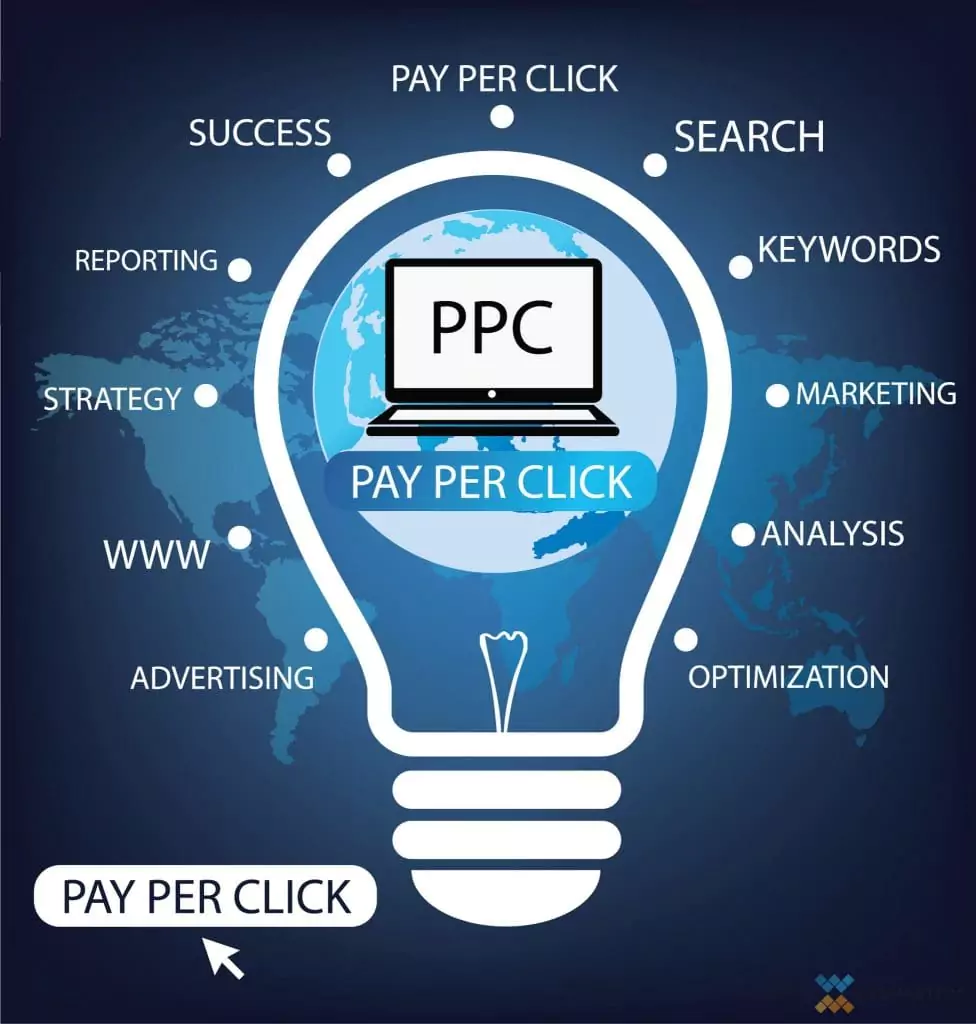
The Appeal of PPC for Plumbers
PPC is appealing to plumbers because it produces fast results in the form of plumbing leads.
Unlike organic search engine optimization, which can take months to yield results, PPC gives plumbing contractors instant gratification.
Of course, ad-driven leads come at a price, which is why PPC is best used as part of a broader plumbing marketing strategy.
PPC Ad Types for Plumbing Companies
Plumbing companies can choose from multiple types of PPC ads to promote their business and services to local consumers.
Below, I’ll list the most common PPC ad types for plumbers:
Search Ads
Search ads are the most common PPC ads for plumbers, appearing at the top of standard search engine results pages.
Google, Bing, and other search engines offer this ad type, and Google’s Search Network expands the ad’s placement onto additional search engines such as ask.com and lycos.com.
These text-based ads emulate an organic SEO result but appear at the very top of the SERP, above the traditional results.
While over 80% of people still click on the top organic results, the PPC search ads also receive substantial engagement.
Social Media Ads
Social media ads appear on platforms like Facebook, Instagram, TikTok, X, YouTube and Linkedin.
Each platform offers multiple ad variations so plumbers can reach consumers in various areas of the app.
Meta advertising platform, which handles Instagram and Facebook Ads, is known for its AI-powered targeting algorithm, which allows plumbing companies to target local customers.
Additionally, social media ads can be retargeted using the Meta pixel.
Display Ads
Display ads appear across a display network of Google properties such as Google Search, Gmail, and YouTube.
Alternatively, advertisers can run display ads on other networks, including Meta Audience Network, Yahoo Advertising, Taboola, and AdMaven.
Like social media ads, display ads can retarget previous website visitors or those who’ve engaged with your social media content.
Note: Google Local Service Ads (LSA) are not pay-per-click but rather pay-per-lead, so they do not follow the PPC protocol.
To learn more, read my article about LSA for plumbing companies.
Ad Budget Types
- CPM (Cost Per 1,000 Impressions): CPM ads are best used for general brand awareness, are distributed on all relative platforms, and are charged a flat rate under 1,000 impressions. CPM is perfect for increasing awareness.
- VCPM (Viewable Cost Per 1,000 Clicks): Like CPM, VCPM ad budgets charge a flat rate per 1,000 views and are used for driving company awareness.
- CPC (Cost Per Click): The most popular selection, this method charges only for clicks instead of views. CPC budgeting works well with sales and traffic increase goals.
- CPV (Cost Per View): Used mainly to increase views and website traffic, CPV budgeted ads charge when the video content is viewed.
- CPA (Cost Per Acquisition): With this budgeting style, you only pay for goal completions. CPA-budgeted ads are great for increasing sales and appointments.
PPC Ads Examples for Plumbers
While reading about PPC ads is helpful to many prospective advertisers, seeing visual examples of ads can make an even more significant impact.
Below are some visual examples of plumber PPC ads:
Paid Search Ad Example
The following search ads example showcases a Google Ad for a local plumbing company:
Google Search ads are shown to users based on their relevance to the query, along with the ad’s quality score and bid amount.
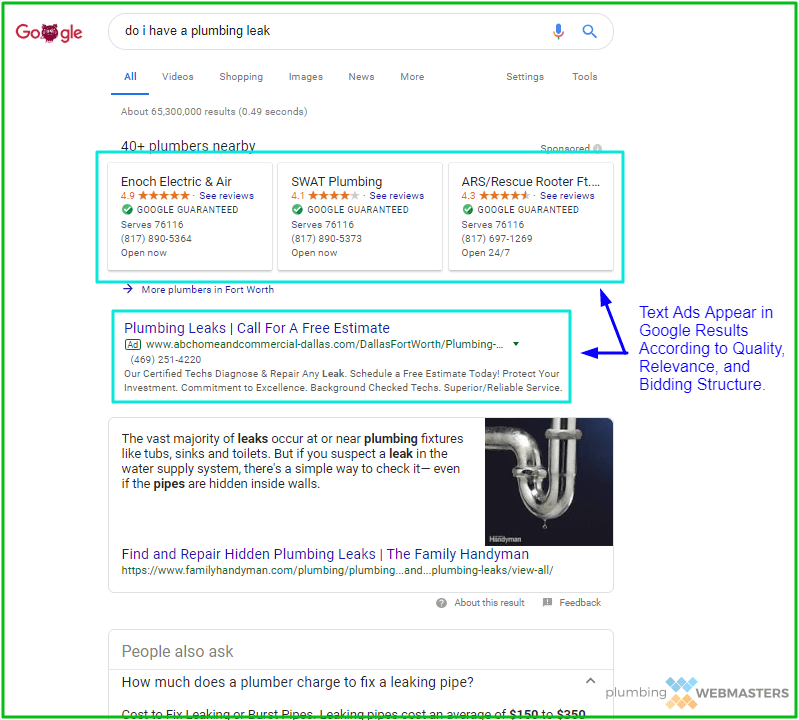
YouTube Ad Example
The YouTube Ad example below is similar to a Google Search Ad but appears on the YouTube platform.
Because YouTube is a Google property, plumbing companies can leverage both entities under a single account.
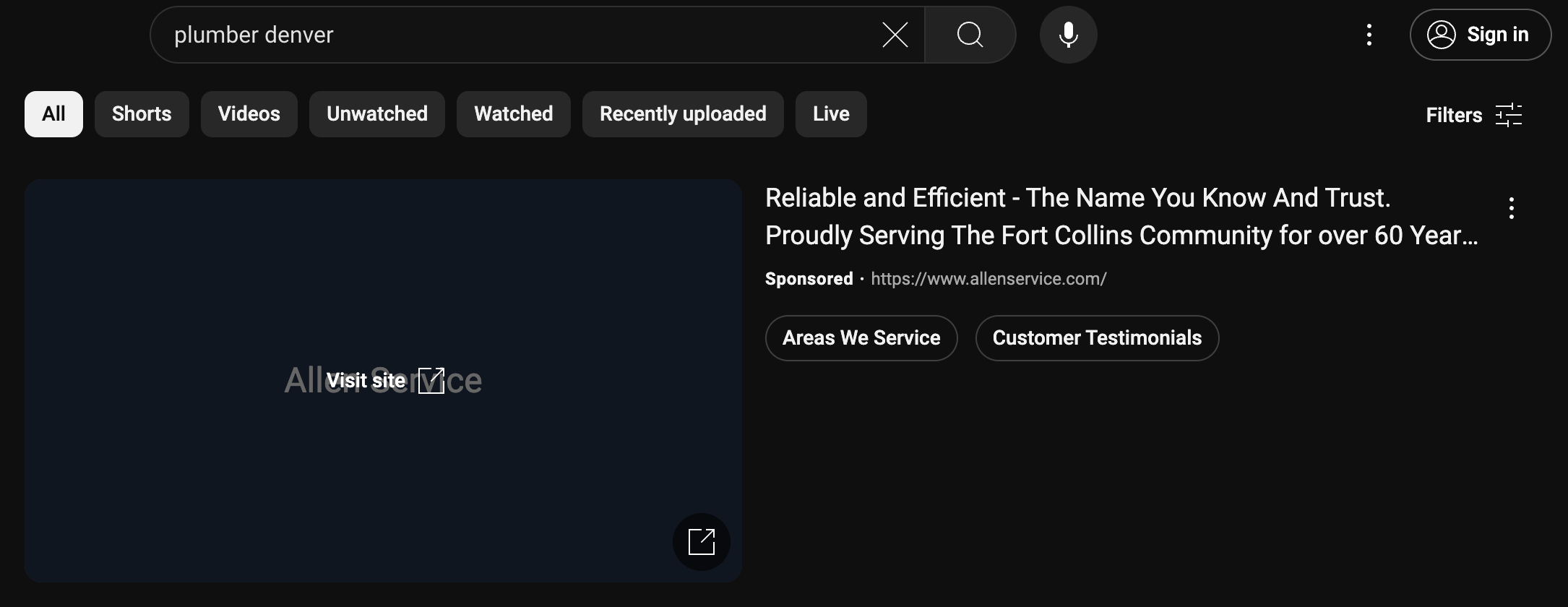
Facebook Ad Example
The Facebook Ad example below showcases a specialized plumbing service for a defined audience.
Facebook’s Advantage+ AI algorithm helps maximize targeting while reducing ad spend.
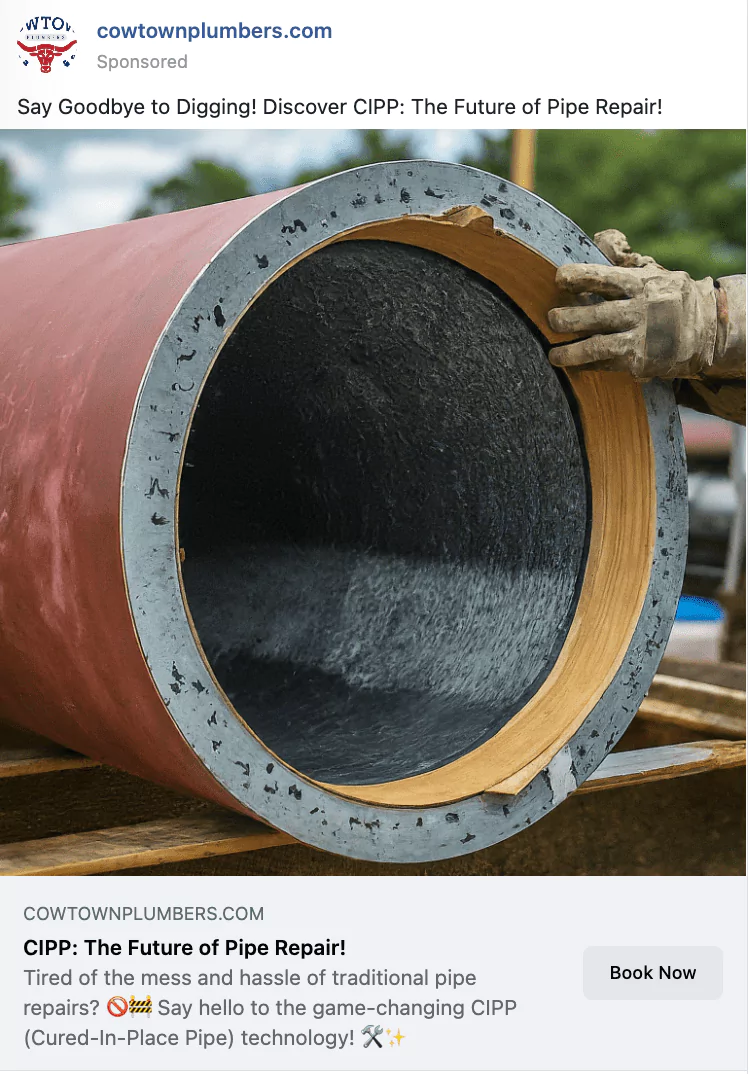
Instagram Ad Example
The Instagram Ad example below showcases another plumbing service for Instagram users.
Instagram image ads perform best with high-quality visuals within the platform’s image resolution parameters of 1080×1080.
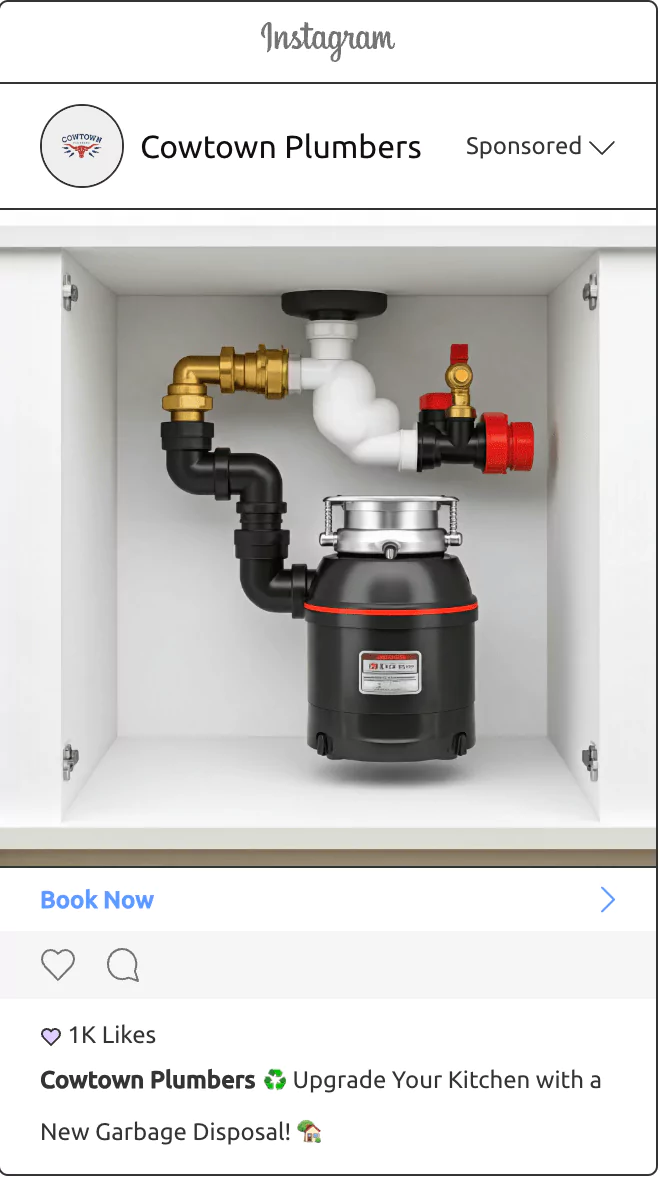
Benefits of PPC for Plumbers
PPC for plumbers presents a mixture of benefits and downsides, which can be navigated to your advantage by following the best practices for digital advertising.
On the one hand, PPC works faster than SEO and can deliver leads to plumbers immediately.
Conversely, plumbing PPC is costly and can quickly drain plumbing companies’ budgets, resulting in an unsustainable business model.
Some marketing agencies disseminate corporatized quotes, claiming that 55% of all plumbing leads come from paid ads.
However, that percentage is misleading because, in many cases, a plumber’s marketing strategy is not tailored for organic success.
With proper digital marketing, over 70% of your leads (at the bare minimum) will come from organic sources.
Below, I’ll outline the benefits of PPC for plumbing contractors:
Quick Results
PPC ads deliver results quickly, which appeals to a sustainable part of the plumbing industry.
Organic marketing campaigns such as SEO can take months to yield tangible results, frustrating plumbers whose mindset reflects that of a contractor rather than a company.
Targeted Clicks
PPC allows advertisers to target clicks from specific locations, which can help reduce wasted ad spending.
Since plumbing companies serve customers locally, promoting services only to those within a defined service area is generally a win-win for everyone.
Performance Feedback
Most PPC platforms are good at reporting ad campaign results and will quickly reveal when ads are underperforming.
Furthermore, PPC reporting yields valuable data that plumbers can leverage in other parts of their digital marketing campaigns.
Budget Control
PPC platforms allow advertisers to set a defined budget so plumbing companies won’t accidentally spend more on advertising than they intended.
This is a crucial component of paid advertising, allowing small businesses like plumbing companies to work within budget.
Downsides of PPC for Plumbers
While PPC works quickly and can help plumbers celebrate immediate lead generation, it can also spark a series of events that stifle long-term growth.
Below, I’ll outline the downsides of PPC for plumbers:
Consumer Trust
PPC ads are meant to emulate organic search results, but users have become more savvy over time, and fewer than ever trust an ad placement more than an organic result.
The user figures that if the plumber has to pay for the advertisement, they must not be a well-known business.
This effect can be partially mitigated if you also rank in the top organic positions, including Google’s Map 3-Pack.
Agency Manipulation
PPC campaigns are easy for plumbing marketers to manipulate with tactics like black-box billing, which hides the distribution of your marketing resources.
Often, agencies offer PPC advertising in a bundle with ad spend, management fees, SEO, and website design (usually glorified hosting).
From there, the marketer will chastise the plumbing business owner by saying, “It’s your fault you don’t get enough leads,” prompting them to spend even more on PPC ads instead of investing in a sustainable organic brand.
Low Barrier To Entry
Unlike organic results, which are engineered to display credible and trustworthy businesses, PPC ads are based mainly on money.
As a result, appearing in search ads (but not organic) can sully your brand’s reputation, labeling you as another “hack” plumber who couldn’t rank in the “real search results.”
Gaining this negative reputation can be hard to shake, especially as your budget is drained from PPC ads and not investing in a sustainable long-term brand.
Expected ROI for PPC Plumber Marketing
While PPC campaign results significantly vary based on factors like location, ad quality, and budget, some data reveals a general benchmark of what plumbers can expect.
Below, I’ll list some sample PPC metrics for a local plumber:
- Average Cost Per Lead: $71.42
- Average Conversion Rate: 9.5%
- Click-Through-Rate: 3.79%
- Cost-Per-Click: $7.56
While $71.42 may seem high to some local plumbing companies, it is far less than a standard print ad, which ranges from $750 to $175,000.
Of course, SEO can produce plumbing leads as low as $7 per lead when calculating leads based on a monthly SEO service plan.
PPC Ads Based on Plumbing Sub-Industry
Your plumbing company’s area of expertise will dictate your advertising campaign strategy. Depending on the range of services you provide, your targeting will be more or less restricted.
The goal is always to maximize conversion rates while minimizing the cost per click, which requires a deliberate and intentional strategy that aligns with your unique value proposition.
Below, I will outline PPC best practices by sub-industry:
PPC for Residential Plumbing
Residential plumbers target homeowners in a defined service area for a standard range of services, from toilet repair to sewer camera video inspection.
Most residential plumbers seek volume because their business model requires servicing several jobs during one business day.
The key targeting parameter for residential plumbing services is location, as service area businesses can’t waste money reaching customers they cannot logistically service.
PPC for Commercial Plumbing
Commercial plumbers have different targeting parameters because their ideal client is an organization or corporation rather than a homeowner.
Commercial jobs are “higher ticket,” so advertisers are willing to spend more to get jobs.
Considering this, a single conversion on a highly competitive commercial plumbing keyword is worth far more than it costs.
PPC for Sewer and Drain Repair
Plumbers specializing in sewer and drain repair, sometimes called rooters, will have a narrower keyword list.
Often, more restrictions on your ad campaign can lead to higher conversion rates as you introduce more “friction” to your ad reach.
The key component to highly targeted plumbing PPC campaigns is landing page relevance, which ensures customers understand you offer the precise service they seek.
PPC for Water Heater Repair
On Google Business Profile’s category list, water heater repair companies are defined as plumbers, which means PPC campaigns also fall under this umbrella.
Water heater PPC ads are one method to find homeowners who require water heater repair or replacement within a defined service area.
Like rooters, water heater repair companies are highly specialized, and their keywords are restricted to queries that include the term water heater, its popular brands, and variations.
Steps to a Succesful Plumber PPC Campaign
PPC’s reputation is mixed throughout the plumbing industry, mainly due to a discrepancy in campaign quality among plumbers.
Below, I’ll outline the steps that successful campaigns use to maximize their performance:
Step 1: Set Goals
PPC is aimless without predetermined goals and can result in overspending.
To set goals, determine if you want to grade performance by traffic, leads, or general brand awareness.
For example, a lead generation PPC ad might focus on 24/7 emergency plumbing services.
Step 2: Define Your Audience
The fastest way to waste ad resources is to target people you cannot logistically service.
Furthermore, targeting non-homers outside a target age group can also waste ad money.
As a local plumber, you should understand your service area and which zip codes you can efficiently send your trucks to.
Step 3: Research and Target Keywords
Use Google Keyword Planner to research terms based on relevance and user intent.
Long-tail keywords have a clear intent, especially those like “sewer camera video inspection fort worth tx.”
Basic head terms like “plumbing” are more hit or miss because the intent is unclear.
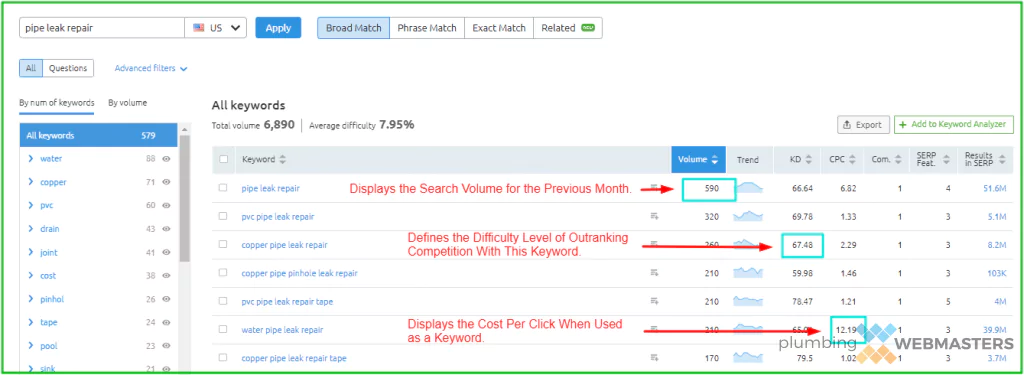
Step 4: Draft Your Ad Copy
Don’t use ChatGPT to generate your ad copy, or at least not without human oversight.
Focus on a compelling headline such as “24/7 Drain Repair – Book Today!” as it elicits urgency from users.
Another concept for ad copy is “pain points,” where you speak directly to a homeowner about common plumbing problems.
Step 5: Select Your Ad Visuals
Select unique and high-quality images or videos to include in your PPC advertisement.
Visuals won’t apply to Google Search Ads, but they do apply to Facebook and Instagram Ads, along with other PPC variations.
The before-and-after plumbing project visual is a proven effective inclusion in high-conversion PPC ads for plumbing companies.
Step 6: Set Your Budget
Your daily budget is paramount for optimizing your plumbing campaign and not overspending on clicks.
Set your daily budget to a number that aligns with your previously defined goals.
As you evaluate your ad’s performance, you may increase or decrease your budget to enhance ROI.
Step 7: Optimize Your Landing Page
Landing pages should reflect the sentiment of your ad copy and appeal to the users who click through.
For example, an ad focused on water heater repair can show a brand new Rannai tankless water heater working like a charm with your best plumber standing next to the finished job.
Another component of landing page optimization is an accessible call-to-action that makes it easy for homeowners to book a service quickly.
Step 8: Track Conversions
Use Google Analytics or Meta Insights to track PPC conversions as you run your ads.
Without conversion tracking, there’s no way to determine if your initial goals are completed.
Conversions may manifest as form fill-outs, opt-ins, or phone calls, all of which can be tracked on various platforms.
Step 9: Evaluate Ad Performance
Make sure you consistently monitor your ad performance, including its click-through-rate and cost-per-lead to
I’ve seen plumbers or their advertising agencies ignore the analytics, resulting in wasted ad spend and diminishing returns.
The most successful ad campaigns constantly adjust their PPC strategy to maximize ROI.
Regularly review campaign performance metrics like click-through rates (CTR), cost-per-lead (CPL), and conversion rates.
Adjust your targeting, ad copy, or budget based on these insights to continually improve results.
Best Practices for Plumbing PPC Ads
While every campaign differs because of resources, locations, and brand identities, advertisers should follow some best practices to maximize campaign performance.
Below, I’ll detail the best practices for plumbing PPC ads:
Use Compelling Calls-to-Action
To increase conversions, encourage users to act with CTAs such as “Call Now for Fast Service!” and surround them with time-limited phrases such as “Limited Slots Available.”
Target Locally
Use Geotargeting for hyperlocal targeting that serves your plumbing ad exclusively to homeowners within your service area.
For example, a Seattle-based plumber would define their radius within the Seattle Metropolitan area to restrict ad spend to that demographic.
Create Mobile-Friendly Ads
Most plumbing PPC ads are clicked via a mobile device, especially for residential plumbing services.
Considering this, crafting your ad for mobile users with mobile-friendly CTAs and mobile-optimized landing pages can increase your conversion rates.
Test and Refine Ads
Use A/B testing to compare ad headlines, formats, and images and their resonance with your target audience.
For example, test whether using the phrase “Same-Day” in front of your service offering improves performance. As you gather data, you can refine your ads.
Leverage Retargeting
Use Meta Pixels or Google Remarketing to reengage with prospects who visited your website but did not submit a contact form.
By serving “follow-up” ads to these previous visitors, you remind them of your service and reduce the cost per click compared to cold targeting.
Monitor Quality Score
Quality Score is Google’s grade for your ad based on its relevance, landing page, and projected click-through rate.
Achieving a favorable Quality Score lowers your cost per click and prioritizes your ad placement.
With this in mind, monitor your Quality Score and improve it when necessary to reduce costs.
Best PPC Tools for Plumbers
Software tools can help advertisers make data-driven decisions about their PPC campaigns that help maximize performance.
Below, I’ll list seven helpful PPC tools for plumbers:
1) Google Keyword Planner
Google Keyword Planner is Google’s own PPC keyword research tool and provides metrics like cost-per-click and estimated search volume.
This tool helps plumbers target keywords closely related to their service offerings, including everything from water heater replacement to sewer camera video inspection.
2) Google Ads Editor
Google Ads Editor is another Google tool that helps advertisers edit keywords, ad groups, and maximum bids in bulk.
The bulk editing feature is key to reducing the time spent on your ad campaign while optimizing efficiency.
3) Facebook Ads Manager
Facebook Ads Manager helps Meta advertisers create, monitor, and optimize PPC campaigns on Facebook and Instagram.
This tool provides valuable data insights for plumbing advertisers, from targeting an audience based on interests and location to tracking campaign performance and monitoring analytics.
4) SEMrush
SEMRush is a powerful keyword research tool with PPC-specific features such as competitor analysis and pay-per-click optimization.
For example, users can evaluate the PPC strategy of their primary competitors and identify gaps in their campaigns.
5) Google Analytics
Google Analytics is the “old-reliable” tool in Google’s toolkit, and it has now been transferred to Google Analytics 4 (GA4).
Plumbers can use GA4 to track PPC conversion rates and monitor which ads drive the most traffic, engagement, and conversions.
6) Facebook Pixel
The Facebook Pixel empowers plumbing companies to gather data about website visitors, which can be retargeted through Meta PPC campaigns.
For example, users who navigate to your “Contact Us” page but exit the site can be reintroduced to your brand and service through Facebook Ads.
7) SpyFu
SpyFu is a well-respected PPC tool that helps plumbing companies study their competitors’ paid advertising strategies, including which keywords they target and the specifics of their ad copy.
Plumbers have traditionally used SpyFu to look for weaknesses or gaps in top competitors’ campaigns, allowing them to use data-driven insights to outperform their rivals.
Final Thoughts on Plumbing PPC Marketing Campaigns
I’ve been helping plumbers with PPC marketing for over 14 years and have seen almost everything in this industry.
Plumbers who succeed with PPC follow the steps outlined in this article and continually monitor the ad’s performance and efficacy.
I’ve witnessed far too many plumbing companies partner with PPC-first ad agencies, only to see their entire budget drained within 6 months, leading to their filing for Chapter 7 bankruptcy.
I founded Plumbing Webmasters as more than a digital marketing agency; it is a community to help hard-working plumbers properly invest their marketing resources, which always includes organic SEO and brand building rather than only PPC.
PPC can work, but only when you choose the right platforms, such as Google Ads or Facebook Ads, and work with the right marketing specialists (like Plumbing Webmasters).
Keyword research and targeting are vital to plumbing PPC success, making tools like Keyword Planner and SEMRush essential to a competent PPC campaign.
Of course, each step depends on creating and optimizing a landing page that engages and converts users who click through your ad.
Plumbing PPC marketing is a valuable component of a border digital marketing strategy, including organic SEO, brand building, and data points.
Whether you are a first-time PPC user or a long-time plumber harmed by lousy campaigns, our strategic plumbing PPC approach can help you reach your goals.



